
views
Avoiding Common Ways of Smudging Your Glasses

Wash your hands before handling your glasses. This is especially important if you’ve been touching dirty or greasy objects. Even your fingers have natural oils on them, which will leave streaks and smudges on your lenses. Only touch your glasses and lenses when you need to, and always wash your hands first. Common sources of dirt and oils that get on eyeglasses include: The fur and skin of household pets Food products that include flour, oil, grease, or spices Workplace objects, including stair railings and elevator buttons
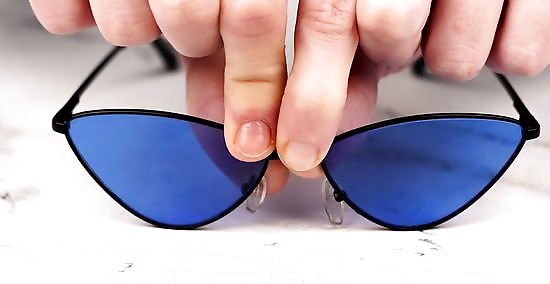
Do not touch the lenses while adjusting your glasses. If your glasses have slipped down your nose and you need to push them back up, grip the frames to do this. Never push directly on the lenses, as this will transfer grease and oils from your hands onto the lenses. Adjusting your glasses by gripping the frames will become a habit over time if you do it consistently and never adjust your glasses by pressing on the lenses.
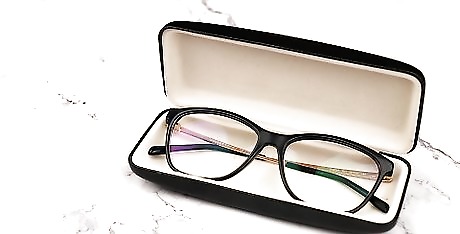
Remove or protect your glasses while cooking on a stove. If you are cooking greasy foods on high heat, the hot oils will spray out of the pan, and can splatter high enough to smudge your glasses. If you need to wear your glasses while cooking, put a lid over the pot to protect yourself and your glasses from being sprayed with hot oil. If your glasses have been smudged by grease, clean them as soon as possible. Foods that are likely to splatter grease and oil while being cooked include: Bacon or other pan-fried meats Eggs Anything sautéed, especially onions

Prevent oils from your face and hair from smudging your glasses. The skin on your face will naturally build up oils during the day, and these can transfer to your lenses if you push your glasses up high on your face. Similarly, natural oils from your hair can leave streaks or smudges on your glasses. Wash your face regularly—at least once a day—to prevent oils from building up and smudging your lenses. If you have long bangs, these can carry oils as well, and potentially transfer that oil to your lenses. Pin your bangs back to prevent them from smudging your glasses.
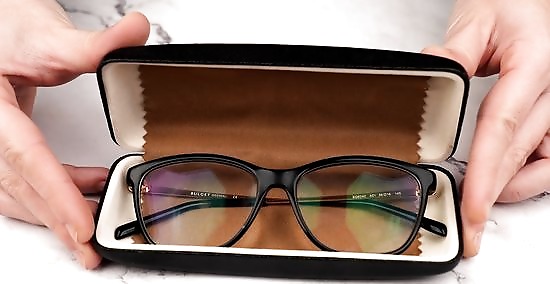
Protect your lenses from inclement weather. Windy, rainy, and dusty weather all present unique challenges for individuals who wear glasses. Be aware that your glasses will be smudged and speckled with dirt after being in a dusty or dirty environment, and will be streaked with water after a rainstorm. Take your glasses off in these environments, or avoid spending much time outdoors when the weather is windy or rainy. Although rainwater will evaporate from your glasses, it will leave behind a residue which smears the lenses. If small dust particles get stuck to your glasses, do not try to rub them off without first rinsing the lenses. Dust can permanently scratch your lenses if rubbed or pressed farther into the glass.
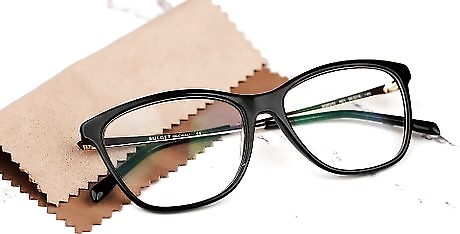
Take your glasses off before going to sleep. It’s important that you never sleep while wearing your glasses. While sleeping, you’ll roll over and move around, and this poses a threat to your glasses. They can easily become smudged by oils from your face and pillow. Worse, you’re at risk of breaking the frame if you roll over while wearing glasses. Even if you’re only lying down to rest, take off your glasses. It’s not worth the risk of rolling over and snapping the frames.
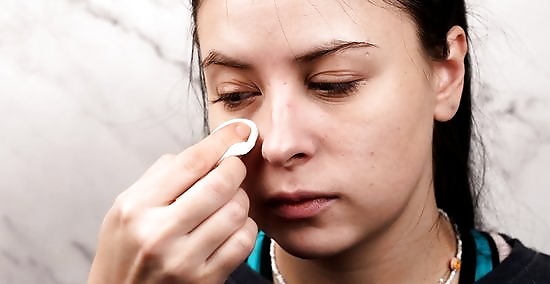
Prevent your makeup from smudging your glasses. When putting on makeup, determine where your glasses’ nose pads contact the bridge of your nose. Lightly wipe that spot on your nose clean from makeup. Otherwise, the makeup on the bridge of your nose is likely to smudge your glasses. Once you’ve cleaned off the makeup from the spots of contact on the bridge of your nose, clean your glasses and gently scrub your nose pads. Because of its high oil content, makeup can be difficult to remove from your lenses.
Cleaning Your Glasses When They’re Dirty
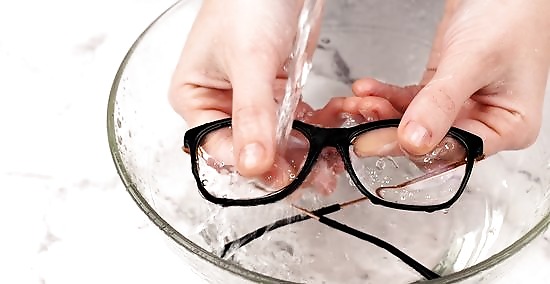
Run the lenses under lukewarm water. At some point, your glasses will inevitably get dirty, whether from contact with your fingers, dirt in the air, or other incidental contact. If the lenses are smudged, moisten them to loosen the dirt and by running the lenses under water. It’s a good idea to wash your hands as well, so that you’re not smearing oils from your fingers onto the lenses. Hot water can damage anti-glare treatments.
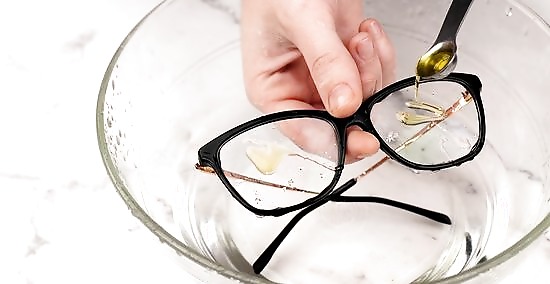
Rub dish soap onto the lenses. Put a small drop on each of your glasses’ lenses, and rub the soap around to cut through the oils and dirt on each lens. Make sure to clean both sides of the lenses, not only the inner side. You can also use hand soap to clean your lenses. Make sure that it is a lotion-free soap, though; otherwise you’ll smudge the lenses with the lotion in the soap.
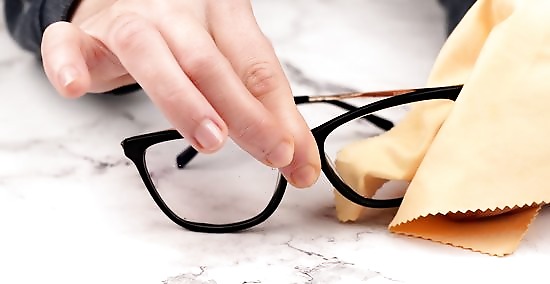
Rinse and dry the lenses. After you’ve washed them, re-rinse the lenses under lukewarm water. Then dry them using a clean, dry, lint-free cloth (microfiber is preferable), taking care not to rub any more dirt or grime on the lenses.
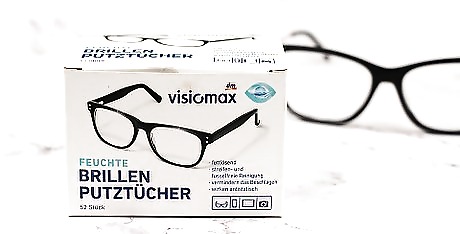
Avoid products that contain ammonia, bleach, or vinegar. These substances are abrasive and will strip away the protective coatings on your glasses. For the same reason, do not clean your glasses using Windex or window cleaner. You should use only commercially-made or homemade eyeglass cleaners to clean your glasses. Be sure the cloth used to dry the lenses has not been laundered with fabric softener or a dryer sheet. Doing so can leave streaks behind. Never spit on your glasses, or clean your lenses using saliva. Saliva is not sanitary and often contains germs and oils which will smudge your glasses.
Protecting Your Glasses and Lenses
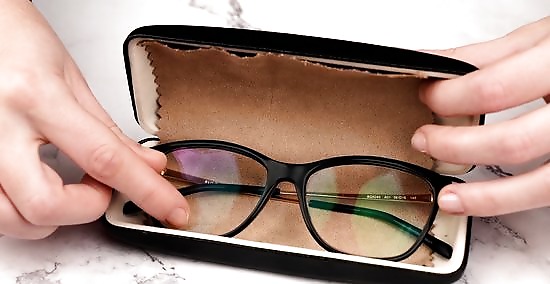
Keep your glasses in their case. When you’re not wearing your glasses, keep them safe by placing them in an eyeglasses case. Without a case, glasses can easily get smudged or damaged. Keep your glasses in their case whenever you’re sleeping. If they’re reading glasses, keep them in a glasses case (when you’re doing an activity other than reading) to prevent dust from getting on them.
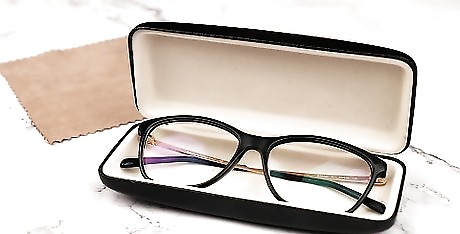
Keep a clean, soft cloth in your glasses case. Optometrists will often give you a soft microfiber cloth with your purchase of glasses. Keep this in the case, and it will provide 2 benefits: keeping your frames cushioned (should you drop the case), and giving you an easy way to wipe the lenses if they become dirty. If you get dust and water or smears of some sort on them, you can just grab your cloth out of your case and clean the lenses. Avoid cleaning the lenses with your shirt, as the fabric will not be as clean as the microfiber cloth.

Remove your glasses before physical activities. Since participating in sports can involve running, flying dust and dirt, falling, and colliding with other players, it’s best to remove your glasses so they do not become smudged or even broken. If you don’t take them off, you risk damaging the lenses and frame. Many people who wear glasses also have backup contact lenses, and choose to wear these when they’re playing sports.
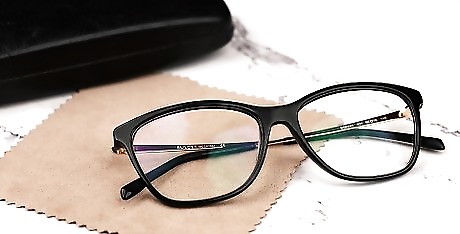
Never lend your glasses to other people. Not only is your prescription meant for you alone, but you also lose control of what happens to your glasses if someone else is wearing them. Other individuals may not know how to handle glasses delicately, and may smudge your lenses or crack the frames.



















Comments
0 comment